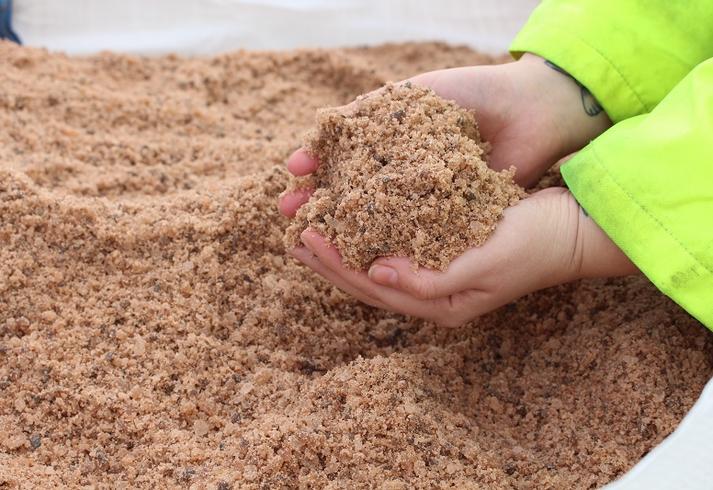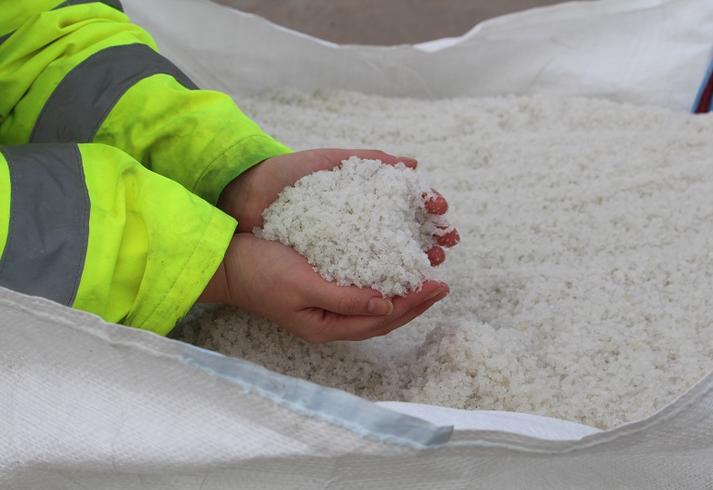Rock Salt Data Sheet
De-Icing Rock Salt
Pure salt has a reddish-brown colouring owing to the presence of a substance called marl - a type of clay. This is a natural impurity due to where the salt deposits are mined, but it doesn't affect the salt's effectiveness in de-icing.
Hazard Information
Rock salt is unlikely to cause harmful effects under normal conditions of handling and use but there are four situations where emergency action is needed. To limit contact, the measures below in "Exposure controls and personal protection" should be followed.
First-aid measures are required when there is:
Eye Contact: Use an eyewash solution or clean water. You must hold the eyelids apart for at least ten minutes. If symptoms persist obtain medical attention immediately.
Skin Contact: After repeated or prolonged skin contact, wash the skin with water. This is highly recommended to reduce the risk of contaminated hands rubbing eyes or entering the mouth.
Ingestion: If rock salt is accidentally swallowed then vomiting is likely. Wash out mouth with water then drink half a pint of water. Seek medical attention, especially if vomiting has not occurred.
Inhalation: Unlikely to be required, but if necessary treat symptomatically. Washing out mouth with water after prolonged exposure would be helpful.
Fire Fighting Procedures
Rock salt is non-flammable and will withstand temperatures up to melting point and beyond without decomposing. No special fire fighting procedure is required, extinguisher media or explosion hazard has been identified.
Cleaning Up
Clear up spillages and wash spillage area with water.
Environmental Measures
The release of grit salt dust into the environment does not pose a significant environmental hazard.
Precautions for Storage & Handling
Storage: Keep away from concentrated acids. Rock salt can be stored outside. Keep away from vegetation that you value.
Handling: Avoid prolonged skin contact. Avoid inhalation of high concentrations of dust. Keep away from concentrated acids and common metals.
Exposure Controls and Personal Protection
Wear suitable personal protection equipment. For Workplace Exposure Limits (WELs) regarding airborne dust are given in the HSE Guidance Note EH40:substance WEL Period
Total inhalable dust 10 mg/m3 8 hour TWA
Respirable dust 4 mg/m3 8 hour TWA
Respirable Silica 0.1mg/m3 8 hour TWA
Personal Protective Equipment
Respiratory Protection Suitable HSE approved respiratory protection should be worn to protect against inhalation of dust.
Hand and Skin Protection Overalls and gloves should be used to prevent contamination of the skin.
Eye Protection Eye protection to the standard of BS EN 1664-4 should be used to prevent dust entering the eyes.
Stability & Reactivity
Conditions Contributing to Chemical Instability Rock salt will react with concentrated acid to produce hydrogen chloride.
Hazardous Decomposition Products None.
Special Precautions Under wet conditions will corrode many common metals, particularly iron, aluminium and zinc.
Toxicological Information
The Short Term Effects are listed below. Action to be taken is listed in "Hazards Information" above.
Eye Contact: High concentrations may cause irritation.
Skin: Dry salt and concentrated solutions will remove the natural greases from the skin resulting in dryness. Repeated and/or prolonged contact may cause irritation.
Ingestion: The swallowing of small amounts is unlikely to cause any adverse effects. Excessive doses may result in irritation of the gastro-intestinal tract, leading to nausea, vomiting and diarrhoea.
Inhalation: High concentration of dust may be an irritant to the respiratory tract.
Long Term Effects
Chronic effects may result from the ingestion of excessive amounts of salt. Ingestion of hypertonic solutions can cause disturbance to the body's electrolyte and fluid balance.
Ecological Information
Aquatic Toxicity Rating:
96 hour LC50 (Fish) 6750mg/l; 48 hour EC50 (Daphnia) 2024mg/l;
72 hour IC50 (Algae) 3014mg/l; Daphnia Subacute 062mg/l;
Fish Subacute 433mg/l.
Earthworm Toxicity
1000/ug/cm2.
Photodegradability
Infinite OH.
Disposal should be in accordance with current local and national legislation.
Not classified as hazardous for transport.
Chemicals (Hazard Information and Packaging for Supply) Regulations: Classification – None.
Workplace Exposure Limits – HSE Guidance note EH40.
Legislation and Other Information
Health & Safety at Work, etc. Act 1974
Control of Substances Hazardous to Health Regulations (COSHH) 2002
Control of Substances Hazardous to Health (Amendment) Regulations 2004
Environmental Protection Act 1990
HSE Guidance Note EH40 (Workplace Exposure Limits)
Any authorised manual on First Aid by St.John's/St. Andrews/Red Cross
Manual Handling Operations Regulations 1992 (as amended)
Prepared in accordance with UK REACH Competent Authority Information
Leaflet 13 - REACH and SDS - May 2008
Guidance References
Available from HMSO, HSE area offices, or local authority Environmental
Health Department:
Workplace Exposure Limits (EH40)
A step-by-step guide to COSHH Assessment (HS[G]97)
An introduction to Local Exhaust Ventilation (HS[G]37)
Respirable Crystalline Silica (EH59)
Dust, General Principles of Protection (EH44)
Control of Respirable Crystalline Silica in Quarries (HS[G]73)
Respirable Crystaline Silica (EH74/2)
Respirable Crystaline Silica (EH75)
IMPORTANT NOTES
The purpose of this data is to provide Health, Safety and Environmental guidance on the safe handling, use and disposal of Rock Salt in the UK. The information contained in this data is correct at the date published, and applies only in relation to, the supply of rock salt.
This data should alert purchasers and/or users to the usual hazards in handling the supplied material when using it within the ordinary range of uses for which such material is normally supplied. If you have purchased or arranged the supply on behalf of a third party who will work with the material supplied it is your duty to pass this information on to them BEFORE such work commences.
Reliance placed on any part or all of the information contained in this data which goes beyond the purpose set out above is entirely at the user's own risk. Without limiting or restricting the terms and conditions upon which the material has been supplied to the extent permitted by law, rocksalt.co.uk disclaims all liability arising directly or indirectly from the content or preparation of this data. This data is a guide and if in doubt about anything in this document please phone 01629 636500
Our Rocksalt Products Include:
Rock Salt
- Bulk Bag
White Rock Salt
- Bulk Bags















